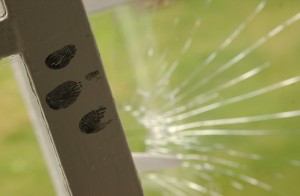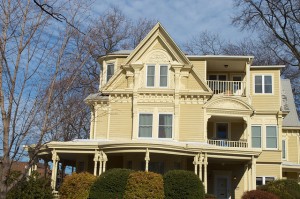A home is so much more than a physical structure that you reside in. It’s where you have lazy Sunday breakfast with your spouse and kids. It’s where you enjoy a cup of hot coffee on your back porch. It’s where you read bedtime stories to your children and tuck them in at night. It’s where you might keep precious assets. It’s where you and your family live life to its fullest. How and what are you doing to protect all of that? Odds are, if you haven’t already installed a home security system, you’ve at least thought about it at one time or another. So what has been preventing you from taking the plunge? Well, like many homeowners you’ve probably convinced yourself or been falsely informed that you don’t need a comprehensive security system. There are a vast array of myths and misconceptions about home security systems, and you will learn why and how they are simply untrue.
My home is in a safe neighborhood, nothing bad could happen here.
Yes, we would all love to believe that we live in a Utopian society where everyone  contributes, gets along, and the sun is always shining, right? Unfortunately, just as the weather is unpredictable, so is human nature. Criminals don’t care if your neighborhood is considered safe, if they see vulnerability, they see opportunity. Don’t fool yourself into thinking your home is safe because of your surroundings. Statistically, 88% of all burglaries happen residentially, 86% happen when someone is home. Don’t wait for something tragic to happen. Take initiative and contact a trusted home security systems specialist at Perfect Connections, Inc. before it’s too late.
contributes, gets along, and the sun is always shining, right? Unfortunately, just as the weather is unpredictable, so is human nature. Criminals don’t care if your neighborhood is considered safe, if they see vulnerability, they see opportunity. Don’t fool yourself into thinking your home is safe because of your surroundings. Statistically, 88% of all burglaries happen residentially, 86% happen when someone is home. Don’t wait for something tragic to happen. Take initiative and contact a trusted home security systems specialist at Perfect Connections, Inc. before it’s too late.
I don’t own anything a burglar/intruder would want.
While it may be true that you don’t own expensive valuable items, or have wads of cash lying around, burglars/intruders aren’t always after your jewelry or money. Whatever the intentions of a criminal, you have to assume if they are breaking into your home, they’re after something. Even if they don’t steal something of monetary value, they might accidentally grab something that is irreplaceable and of emotional significance, or worse, cause harm to you or a family member. According to safewise.com, “1 in 3 homes without a security system will fall victim to a burglary as compared to 1 in 250 homes that do have a security system.” Don’t presume to know what criminals are after, protect what matters most with a comprehensive security system solution.
Security systems don’t work and are too expensive.
Thinking your security system is going to act like an impenetrable force field that will deflect potential intruders or criminal behavior is just not realistic. Neither is believing a comprehensive security system won’t do anything for your home and your family, or that it’s too costly. The cost in damages from a burglary can be far more financially draining than the cost of a comprehensive security system with alarm monitoring. Never mind the emotional toll it can take on you and your family.
Luckily, the evolution of security systems has allowed professionals to offer a wider range of economic solutions to fit your budget. You can actually save money by installing a home security system; many home insurance providers offer discounts for doing so. Beware of security systems companies that lowball their price quotes, odds are you’ll end up being just a number in a sea of inadequately protected customers. Watch out for companies that offer you an “accurate” quote over the phone, how can they asses your home’s needs if they’ve never been there? A full home security assessment should be done in person by a licensed specialist, and don’t let anyone convince you otherwise.
Security systems have been proven to deter intruders, in fact the Electronic Security Association’s “Home Safety Fast Facts” report indicates 9 out of 10 burglars purposefully avoid homes with security systems. Thinking that security systems don’t work fast enough is inaccurate. Some systems alert the authorities within 45 seconds, and if a patrol car is in the area, the likelihood of the perpetrator being caught is higher. Even if a burglar were to get into your home, the second your alarm goes off, the sound and attention will typically drive your intruder away.
My home is not built to accept a security system.
 Maybe you live in an old Colonial or Victorian house where the walls are solid and accessibility throughout the home is challenging. You might assume the construction of your home wouldn’t allow the installation of a home security system because it would require extensive drilling and/or remodeling. In the past there might have been a tinge of truth to that assumption, however, today many if not most systems are or have wireless capabilities. Not only is a wireless system convenient in older homes, or any home for that matter, but it’s aesthetically more pleasing as it eliminates any loose or dangling wires. What if a burglar were to cut phone and power lines? According to nightwatchprotection.com, “With wireless phone and internet technology combined with battery and backup generator support, you can expect your security system to be up and running under the worst conditions.”
Maybe you live in an old Colonial or Victorian house where the walls are solid and accessibility throughout the home is challenging. You might assume the construction of your home wouldn’t allow the installation of a home security system because it would require extensive drilling and/or remodeling. In the past there might have been a tinge of truth to that assumption, however, today many if not most systems are or have wireless capabilities. Not only is a wireless system convenient in older homes, or any home for that matter, but it’s aesthetically more pleasing as it eliminates any loose or dangling wires. What if a burglar were to cut phone and power lines? According to nightwatchprotection.com, “With wireless phone and internet technology combined with battery and backup generator support, you can expect your security system to be up and running under the worst conditions.”
My pets will set off false alarms, besides they’re like built-in security units.
While a barking dog can make a potential intruder run in the opposite direction, they can’t always differentiate between a threat and a familiarity, never mind the fact they can’t contact emergency services. Pets may not alert you if they recognize the intruder, for example, someone who had previously done work in your home. A comprehensive security system does not discriminate, if a window is broken, the alarm goes off. If the door is kicked in, the alarm will sound and the authorities will be notified, giving you and your family time to get to a safe place.
Worrying your pets will sound a false alarm is less of concern with todays’ advanced motion detectors. The detectors that are pet friendly are set to pick up motion from objects over a certain weight. This decreases the chances of a false alarm, and you don’t have to fret about your pets wandering around your home.
All security systems are the same and they’re too complicated.
Couldn’t be farther from the truth. Each security systems company will have different products, procedures, and policies. Your security systems professional should be able to customize a comprehensive system that suits the individual needs of your home. Don’t fall for a “one size fits all” solution. As far as systems being too complicated, technological advancements have simplified user interfaces making them easier to operate. Many systems utilize graphic touch screen controls that provide step by step instructions.
It’s important to do your homework and shop around to figure out which company best suits your needs. Put your trust in companies with a proven customer retention record and a history of experience like Perfect Connections, Inc. We have 98% Customer Loyalty Rating, and have been providing security system services to Northern and Central New Jersey since 1992.
Image Credits: Image #1 by West Midlands Police-Flickr-Creative Commons, Image #2 by Brad Clinesmith-Flickr-Creative Commons,
 n regards to EAC (electronic access control), “In a modern EAC system, the readers are designed to recognize codes (something you know), credentials (something you have), or
n regards to EAC (electronic access control), “In a modern EAC system, the readers are designed to recognize codes (something you know), credentials (something you have), or 

 ationwide report from the
ationwide report from the 


